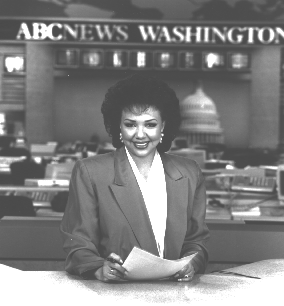Page 28
[Begin Tape 1, Side A]
Moorhus: Let's start with getting you from Iowa to Chicago, when you finished your graduate work in Iowa.
Simpson: I finished my graduate work at Iowa with an intention of doing my thesis, which was to be done to get my master's degree, but I had finished all the course work, so I thought I would go and find a job and work on the thesis while I did that.
As I may have told you, it was 1965, and I had had all these problems before, finding work, because I was black and female. Now the job offers were coming from all over—from newspapers, from the Cincinnati Post, the St. Louis Post-Dispatch. I went around and started interviewing for newspapers, because, again, although I was encouraged to go into broadcasting, still most of my training was in newspapering, and that's what I expected to be, a newspaper reporter. UPI [United Press International], AP [Associated Press], I was talking to the [Chicago] Tribune, but now a lot of people that had not been interested in me became very suddenly interested in me. This was after Birmingham and the dogs and the hoses, and it's Malcolm X and it's the civil rights movement. It's the height of the civil rights movement and the freedom rides. Clearly, employers were getting the message that they should be doing something about minorities in this industry, and I'm sure it's a time that everybody began to assess, as blacks were demonstrating in the South for rights—that everyone started becoming conscious of this big story, this huge national story of the civil rights revolution.
They started realizing, "Maybe we need some black reporter that can really explain this to the public." There were many terrific white reporters that covered the civil rights movement, but I think all across the country people in this business began to say, "We probably need a black perspective on this, and there are probably stories that can be told, an access that can be gotten that a white reporter could not." It's about that time that H. Rap Brown and Stokely Carmichael and the whole black power movement was beginning to emerge out of the civil rights movement, that all-black consciousness, "black is beautiful," and all of that. You had that working at the same time as Martin Luther King's non-violent approach; other people are saying, "Hey, this non-violence is not working." Some of those organizations would only talk to black reporters and made it clear, and they saw that as a way of getting people into the business that might not ever have an opportunity. That began happening all around the country with local black organizations—"We're not going to talk to white reporters."
Moorhus: You had said last time that one of the reasons you went to graduate school was because you thought, "Well, if I have a master's degree—" You said you wanted a master's degree because you thought if you had another degree, you could get another job. Did you try at all in '64 to look to move from Tuskegee into another media position?
Simpson: No.
Moorhus: The corollary question is, did things change that much between '64 and '65?

